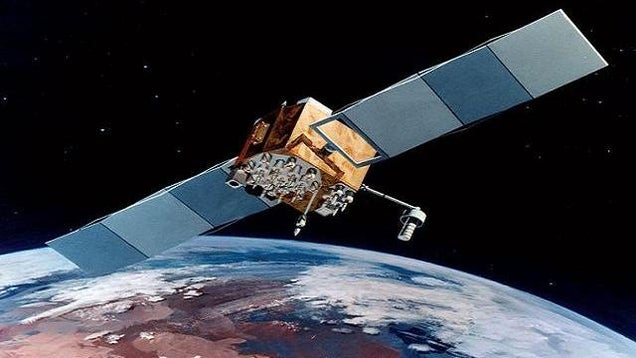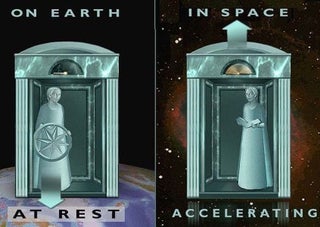
Special and general relativity help us see time, space, and energy in strange new ways. That strangeness seems to remove the theories from our everyday experience. Despite their exotic appeal, Einstein's famous theories are part of our everyday life. Find out how you depend on special and general relativity to find your way around.
The heady realms of conceptual physics received their most cherished jewels between 1905 and 1916, when Einstein perfected his theories of first special and then general relativity. They changed the way people saw space, time, and gravity, and yet they were abstract. Newton's discoveries about gravity were revolutionary, but they dealt with a phenomenon that people saw every day. Einstein's work was confined black holes and to certain irregularities in the orbit of Mercury. As groundbreaking as they were, they were the concern of people who worked in very obscure labs or people who pontificated in armchairs.
Ah, but things have changed, and relativity isn't an abstract concept anymore. Not by a long route. Specifically, not by the long route that your car's SatNav suggests to get to your destination. Whenever you use the GPS on your phone, or travel by jet, you rely on Einstein's brain.
Special Relativity
Special relativity was dreamed up by Einstein in 1905, and it made waves the moment people heard about it. Although it famously uses the word 'relativity,' it should actually be named 'absolutism.' Relativity was the brainchild of Galileo, hundreds of years before. Galileo noted that there was no way to establish an objective frame of reference for motion. If we are sitting on the curb, eating ice cream (we don't have to be eating, just sitting, but I like thinking about eating ice cream), and someone goes by on roller skates, we might think that we're staying still and the person on skates is moving, but someone passing in a car will think we're both moving and they're staying still. And aliens passing by in orbit will look down and see the planet moving and think that no one on earth is staying still. Every speed is relative.
By the time Einstein came around, it was proven experimentally that not every speed was relative. Light speed was always light speed, no matter if you were running toward the source of light or backing away from it. Einstein looked at this absolute speed and decided, in order for it to remain absolute, everything else had to give.
 SEXPAND
SEXPANDSay someone was on a moving sidewalk that was going within five miles per hour of light speed. On this moving sidewalk, they were jogging forward ten miles per hour. Then they had to be moving faster than the speed of light. Oh, but no! If the person jogged for ten miles along the sidewalk, and then looked down at their watch, they would see that an hour had passed. If a person watching them from off the sidewalk looked down at their watch when the person had stopped jogging, they would see that over two hours had passed. This meant that the jogger had, to the person at rest, been going under five miles per hour, and had not broken the universal speed limit. (Actually, speed does lot of weird physical stuff with length elongation and shrinking width, so it's more complicated than that, but time is the major casualty of relativity.) The two people would have experienced two different amounts of time, depending on their relative speed.
Preposterous! Time doesn't work that way. Except that the satellites that orbit the planet go about 14,000 kilometers an hour, and because of this, their clocks are slowed by about seven microseconds per day. They are going faster than us earthbound folks, and they need to adjust their clocks appropriately.
General Relativity
Note above that I didn't say that clocks on satellites go slower than earth clocks - I said that they're slowed. In actuality, they go faster. Not because their orbiting speed doesn't slow them down - it does - but because something else speeds them up, and it's general relativity. General relativity is based on what Einstein called the equivalence principle. He realized one day that if someone were in a space ship being accelerated at 9.8 meters per second squared, and if that space ship had no windows and one hell of a muffler, that person wouldn't ever know that they were not on earth. They'd feel the same pull towards the floor that anyone on earth did. Einstein expanded this principle to figure out that spacetime is curved, and gravity is an expression of that curve, but we don't need to get into picturing curved reality.
 SEXPAND
SEXPAND
Instead we just need to think about being in that space ship. Remember that it's not just moving, it's accelerating constantly. We on the ground shoot a little photon up towards the ceiling. Light moves at a constant speed, and photons oscillate at a set speed. Someone on the ceiling is being accelerated away from the photon coming up from the ground, and so the photon they catch oscillates a little more slowly for the person on the ceiling than it does for the person on the ground. If the person on the ceiling were to shoot a photon back, we on the ground would be accelerated into it by the person on the ceiling, and so the photon would seem to oscillate a little faster for us than it would for them. We look up at them and say, "Your photon is oscillating too fast." They look down at us and say, "No, your photon is oscillating too slow." Time is going faster for them than it is for us.
Again, the idea is silly. But again it's true. Satellites in orbit have clocks that run 45 microseconds fast per day because of this phenomenon. Added to the slowing of time due to special relativity, and the satellites have to adjust their time by about 38 microseconds per day.
So What Can 38 Microseconds Do?
Jets and cars and boats and any kind of vehicle or project that uses GPS relies on these satellites to know where they are and when they are. The GPS system consists of 24 satellites orbiting 20,000 kilometers from the earth at 14,000 kilometers per hour. Anywhere on earth, a signal can be received from at least four of these satellites. These signals contain time stamps, and the orbit of the satellite is known. An earthbound GPS device takes the time stamps from several satellites and by measuring the different stamps from different positions calculates its position to within about 15 meters.
This works only if the time is accurate to within 50 nanoseconds. Nanoseconds are billionths of a second. Microseconds are millionths of a second. Being off by thirty-eight microseconds a day, every day, mean errors are going to stack up. Both the little GPS device in your car that talks to you in Darth Vader's voice and the satellites have programming that takes into account the relativistic time differences. If neither were there, the entire GPS system would be useless. All told, GPS without relativity would fail after the first two minutes.
No comments:
Post a Comment